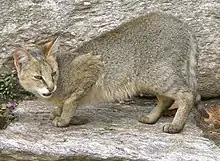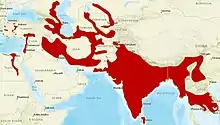Jungle cat
The jungle cat (Felis chaus)[2] is a successful and widespread wild cat. It ranges from Egypt in the west to China in the east, and it is common in India.
| Jungle cat | |
|---|---|
 | |
| Indian jungle cat | |
| Scientific classification | |
| Domain: | Eukaryota |
| Kingdom: | Animalia |
| Phylum: | Chordata |
| Class: | Mammalia |
| Order: | Carnivora |
| Suborder: | Feliformia |
| Family: | Felidae |
| Subfamily: | Felinae |
| Genus: | Felis |
| Species: | F. chaus |
| Binomial name | |
| Felis chaus Schreber, 1777 | |
| Subspecies | |
|
See text | |
 | |
| Distribution of the jungle cat in 2016[1] | |
| Synonyms[2] | |
|
List
| |
The jungle cat is the largest remaining species of the wild cat genus Felis. It is 20 to 37 inches in body length (50 to 97 cm), with a 8 to 12 inch tail (20 to 31 cm).
True to Bergmann's rule, the felid is largest at the northern limits of its range and becomes smaller-bodied closer to the tropics.[3]
They live in savannas, tropical dry forests and reedbeds along rivers and lakes in the lowlands, but, despite the name, are not found in rainforests. Although they are adaptable animals, being found even in dry steppe, they prefer wetland environments with tall grasses or reeds in which to hide.
Distribution
The jungle cat lives in the Middle East, the Indian subcontinent, central and Southeast Asia, Sri Lanka and in southern China.[1] The jungle cat lives in places with lots of water and thick vegetation, such as swamps, wetlands, littoral and riparian areas, grasslands and shrub. It commonly lives in agricultural lands, such as fields of bean and sugarcane, in its range. It has often been seen near humans. It can even live in places with little vegetation. It is rare in places with lots of snow. Historical records show that it lives in altitudes of 2,310 m (7,580 ft) in the Himalayas. It does not like to live in rainforests and woodlands.
In Turkey, it has been recorded in wetlands near Manavgat, in the Akyatan Lagoon on the southern coast and near Lake Eğirdir. In Palestine, it was recorded in the Nablus, Ramallah, Jericho and Jerusalem.
In Iran, it lives in a lot of habitat. It lives from plains and agriculture lands to mountains at altitudes of 45 to 4,178 m (148 to 13,707 ft) in at least 23 of 31 provinces of Iran. In Pakistan, it was photographed in Haripur, Dera Ismail Khan, Sialkot Districts and Langh Lake Wildlife Sanctuary.
In India, it is the most common small wild cat. In Nepal, it was recorded in alpine habitat at altitudes of 3,000–3,300 m (9,800–10,800 ft) in Annapurna Conservation Area.
A few jungle cat mummies were found among the cats in ancient Egypt.[4]
Feeding
The jungle cat is mostly a carnivore. It likes to eat small mammals like gerbils, hares and rodents. It also hunts birds, fish, frogs, insects and small snakes. Its prey usually weighs less than 1 kg (2.2 lb). Sometimes, it eats mammals as large as young gazelles. The jungle cat is a partial omnivore. It eats fruits, especially in winter.
The jungle cat hunts by stalking its prey. It then chases its prey. The jungle cats ears helps the jungle cat to know where its prey is. It uses different ways to catch prey. Like the caracal, the jungle cat can jump high into the air to catch birds. It is a great climber. The jungle cat can run up to 32 km/h (20 mph). It is a good swimmer. It can swim up to 1.5 km (0.93 mi) in water. It can jump into water to catch fish.[5]
References
- Gray, T.N.E.; Timmins, R.J.; Jathana, D.; Duckworth, J.W.; Baral, H. & Mukherjee, S. (2016). "Felis chaus". The IUCN Red List of Threatened Species. 2016. IUCN: e.T8540A50651463. doi:10.2305/IUCN.UK.2016-2.RLTS.T8540A50651463.en.
- Wozencraft W.C. 2005. Order Carnivora. In Wilson D.E. & Reeder D.M. Mammal species of the World. 3rd ed, Johns Hopkins University Press. pp. 532–628. ISBN 978-0-8018-8221-0
- Burnie D. and Wilson D.E. 2001. Animal: the definitive visual guide to the world's wildlife. Dorling Kindersley, London. ISBN 0789477645
- Sunquist, F.; Sunquist, M. (2014). The Wild Cat Book: Everything You Ever Wanted to Know about Cats. University of Chicago Press. ISBN 9780226780269.
{{cite book}}: CS1 maint: multiple names: authors list (link) - Sunquist, M. & Sunquist, F. (2002). Jungle cat Felis chaus (Schreber, 1777). University of Chicago Press. ISBN 978-0-226-77999-7.
{{cite book}}: CS1 maint: multiple names: authors list (link)
